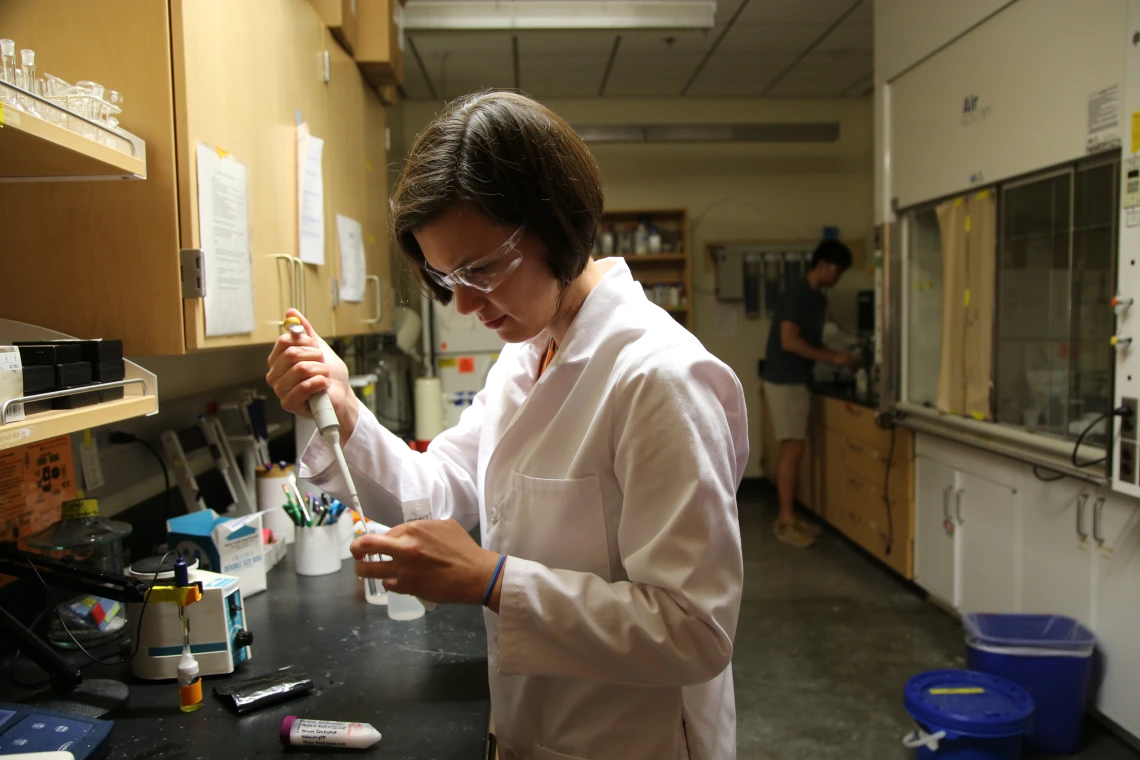UArizona Bioscience Startups Earn $30K through Flinn Foundation Entrepreneurship Program
New companies are beneficiaries and products of a thriving innovation ecosystem

Colleen Janczak in the lab.
Photo: Paul Tumarkin/Tech Launch Arizona
TUCSON, Ariz. – Two startups founded to commercialize inventions developed at the University of Arizona have been accepted into the 2021 Flinn Foundation Bioscience Entrepreneurship Program.
The companies, Botanisol Analytics and Scintillation Nanotechnologies, each will receive $30,000 in funding support through a nonprofit partner, a customized learning plan, and connections with the state’s bioscience leaders in business, research, and policy.
“We have been supporting the development and coherence of the southern Arizona innovation ecosystem since TLA launched, and now our inventors and entrepreneurs are realizing the benefits,” said Doug Hockstad, assistant vice president of Tech Launch Arizona (TLA), the UArizona office that commercializes inventions stemming from research and innovation. “With funding from groups like the Flinn Foundation, angels and new venture capital firms, along with professional services, mentorship and facilities all coming together, it really has become place where everyone is gathering and supporting one another for success.”
Phoenix-based Botanisol Analytics is developing a rapid, digital virus screener for COVID-19 and other pathogens. Tom Milster, professor in the James C. Wyant College of Optical Sciences, originally invented the technology behind the device, which UArizona patented and the company then licensed.
The portable device uses a laser to detect molecular signatures and allows for real-time analysis, and can be used in public spaces like airports and hospitals. It can be operated anywhere by minimally trained, non-medical personnel and provides results about chemical and biological threats in less than 10 minutes.
Scintillation Nanotechnologies develops, manufactures and sells multiplexed nanoscale radioisotope detectors for use in drug discovery in academic, biotech and pharmaceutical research laboratories. The foundational technology, invented by professor Craig Aspinwall and Colleen Janczak, a researcher in the Department of Chemistry and Biochemistry and BIO5 Institute member at the time, allows for a deeper understanding of complex biological processes and opens possibilities for more precise disease diagnosis and treatment.
Janczak now serves as co-founder and head of research and development for the company.
Both company teams have leveraged multiple ecosystem resources to prepare for their next steps. TLA worked with the researchers to protect the inventions on behalf of UArizona and license them to the companies. TLA mentors were available to advise them on strategy, help develop their business plans and help strengthen their leadership teams.
The startups also participated in the TLA National Science Foundation (NSF) I-Corps program, which taught them techniques to strategically identify target customers and better translate their inventions from laboratory to marketplace. After completing the course, Scintillation Nanotechnologies was accepted into the highly competitive and more comprehensive national-level I-Corps program and has secured a $224,700 Phase 1 Small Business Innovation Research (SBIR) grant from the NSF.
Scintillation Nanotechnologies has since gone on to participate in the Advanced Entrepreneurship program at Arizona Forge, designed to help new companies strategize and scale.
Five other Arizona-based firms also were accepted into the Flinn program: LabPair, which also participated in the TLA/NSF I-Corps Program; Movement Interactive; Paxauris; Satori Orthopaedics; and TapRoot Interventions & Solutions. Since 2014, the Flinn Foundation has accepted 47 bioscience firms into its program, providing nearly $1.4 million in support.
The Flinn Foundation is a privately endowed, philanthropic grant-making organization established in 1965 by Dr. Robert S. and Irene P. Flinn to improve the quality of life in Arizona to benefit future generations. In addition to advancing the biosciences in the state, the foundation supports the Flinn Scholars Program, a merit-based college scholarship program; arts and culture; and the Arizona Center for Civic Leadership.
The selected firms must be engaged in the commercialization of bioscience research and biotechnology and/or the sale of products in the areas of medical devices and equipment; drugs, pharmaceuticals and diagnostics; agricultural feedstock and chemicals; research, testing and medical labs; or bioscience-related distribution—the industry categories recognized together as the biosciences in Arizona’s Bioscience Roadmap.

